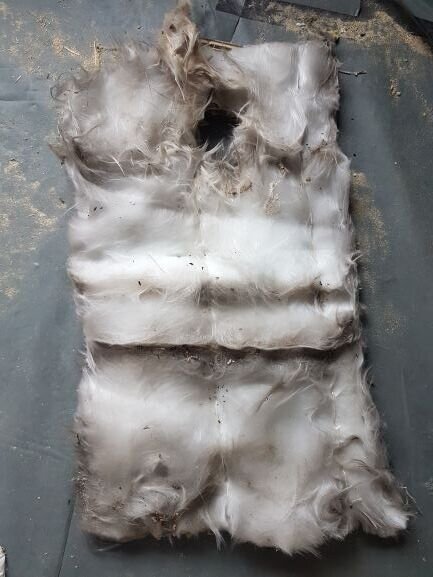Afternoons (1) — Skinning a House
In our family, life only catches speed in the afternoon. And so, it was on a spring afternoon in our new, though very old, weekend-shed in Brandenburg that Ivo, our 6-year-old son, started barking at the neighbors (whose dogs barked at us), and I decided that we’d need a proper fence——something to mark our territory and set everyone at ease. And it was on the same afternoon that the kitchen door kept squeaking open. It slid open, again and again, and it was clear that it wasn’t the wind; no wind capable of opening a door ever moved that slow. ——And whoever was in the kitchen at that particular time would turn and look at the door to greet the stranger that had entered, but would see no one there. Riad, who had decided to quickly fix the problem, ended up spending a good part of three weekends cursing locks and doorknobs. The door resisted fixing.
And the dogs——did they bark at us because we were strangers, or because they thought we were the previous, unloved, owners who’d come back? As we overcame our big-city suspicion of Brandenburg locals and made an effort to strike up a friendly rapport with their (German-flag-curtains) human, it certainly helped. On one afternoon, she brought us eggs from their chickens (brown, white, green) and we returned the favor with homemade (cloudy yellow) elderflower syrup. In a village, people need each other, she said and winked.
On another afternoon, we arrived to spend the weekend, after the house had been closed up for two weeks and found a small bird dead in the corner of a room. How it had gotten there was a mystery, seeing that the door to the room was closed as was the single, tiny window.
The previous autumn, we had been hunting houses for a while and were moderately happy to spot this one within our range. The house was old and we moved quickly, but soon realized that houses with long, hard lives behind them have a way of fighting back from the beyond. The house might have been dead, but the break-down process was alive. At first, we thought our job was to try and roll back the decay, but rather we were arranging this body to fit us, changing the direction of the process, extending it to gain time for ourselves, and thereby becoming part of it.
I suppose the haunted houses of ghost stories, like most fiction, are based on real-life experience. Like the experience of how the older a house gets, the more of an independent organism it becomes——always hosting and supporting other beings, most of them hidden; swallows, bats, mice, rats, memories, ghosts, martens——and how it rests in a delicate equilibrium, implying that one can’t, for example, simply buy a new lock for the kitchen door and expect it to work just because the measures are right. And as you modify walls, windows, and rooms to your needs the house might begin to change you a little too.
From October to May, on many weekend afternoons, we removed glass wool, drenched in all sorts of marten excrements. The marten had made a nest there. It couldn’t have been for just one season, judging by the number of bones and fish heads buried in the insulation, birth blood, the wooden beams rotting in ammonium humidity. Little by little, we fished out the ragged synthetic fur from between the walls and under the roof, and dried-up little turds rained down on us.
We meant well to strip the house of its creepy glass wool and marten shit, but we were slow and in winter it stood there stone-cold as the temperature dropped. As we removed the layers of dirt, we began to fear that there was something wrong with the house underneath. Something had been eating at the roof beams. Symptoms had been patched over, causes not addressed. The old owners had mentioned the option of calling the local handyman, living three doors down the main (and only) street in an impressive yellow half-timbered house, but warned us that he held Nazi sympathies, and so we shouldn’t discuss politics with him. That, to us, felt like the wrong way to go about it. Also, it didn’t seem that he had done a very good job fixing things around the house.
Some things are hard to get rid of and it has to be done with empathy and firm intent——like with the case of a marten. Others are more than hard to get rid of and overwhelming to deal with face to face, like Nazis. So I focused on martens and ghosts and went about in frightened denial regarding the Nazi down the road. ——Until we heard that he’d had to move to take care of his elderly mother, that is. It sounded surprisingly human. Whatever that means. In any case, maybe we should have called him and consequently made up our own opinion?
Through those afternoons at the house, we were rearranging its bones, inserting a new insulating membrane, planting a seedling in the community by giving and receiving gifts and favors; hoping that the house would wake up to yet another life. That the village eco-system would accept this new limb that had decided to grow there——sometimes, to get out of the city.
On the third spring weekend, the door was fixed and both the dogs and Ivo had stopped barking. Sunlight and the buzzing of insects descended on us, and as the heat waves started rolling in we were grateful that the old bones of the house seemed utterly resistant to warmth.
▣



